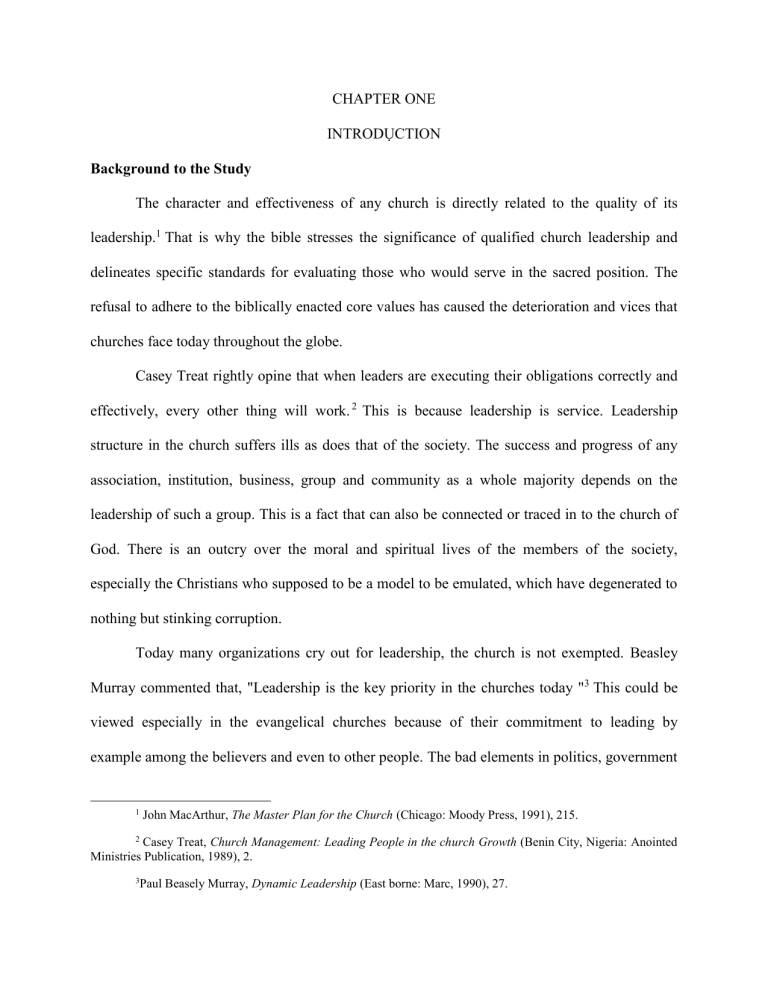
CHAPTER ONE INTRODỤCTION Background to the Study The character and effectiveness of any church is directly related to the quality of its leadership.1 That is why the bible stresses the significance of qualified church leadership and delineates specific standards for evaluating those who would serve in the sacred position. The refusal to adhere to the biblically enacted core values has caused the deterioration and vices that churches face today throughout the globe. Casey Treat rightly opine that when leaders are executing their obligations correctly and effectively, every other thing will work. 2 This is because leadership is service. Leadership structure in the church suffers ills as does that of the society. The success and progress of any association, institution, business, group and community as a whole majority depends on the leadership of such a group. This is a fact that can also be connected or traced in to the church of God. There is an outcry over the moral and spiritual lives of the members of the society, especially the Christians who supposed to be a model to be emulated, which have degenerated to nothing but stinking corruption. Today many organizations cry out for leadership, the church is not exempted. Beasley Murray commented that, "Leadership is the key priority in the churches today "3 This could be viewed especially in the evangelical churches because of their commitment to leading by example among the believers and even to other people. The bad elements in politics, government 1 John MacArthur, The Master Plan for the Church (Chicago: Moody Press, 1991), 215. 2 Casey Treat, Church Management: Leading People in the church Growth (Benin City, Nigeria: Anointed Ministries Publication, 1989), 2. 3 Paul Beasely Murray, Dynamic Leadership (East borne: Marc, 1990), 27. parliaments and ministries can be described as the direct products of bad leadership in our society. The church of God is what people are looking up to as a nucleus of the holy and a purified people with a distinct and special character which emulated from Jesus Christ, the greatest leader the world as ever recorded. Unfortunately, as numerous as church buildings are and as plenteous as leaders with various degrees titles are, so also are immoralities and ungodliness increase in an alarming rate in the church of God and in the society at large. From an actual perspective, majority of the problem facing the church today could be traced to its leadership. The leadership today is no longer what it used to be when compared with early Christians. Calling into leadership then was not a thing of personal interest. Those that were convinced of being called felt a burden for some causes or issues and began to seek God's will through prayers. They saw their leadership position as a privilege to serve rather than to be served. It was not a position easily rushed to, but attained only after it has been confirmed by the prompting of the Holy Spirit or by any man of God that one is convinced about his relationship with the Holy Spirit. The fact today as negated our previous understanding about leadership. The church leadership has become a position worth competing for in order to raise one standard, thus resulting in rivalry and local politics among those struggling for the leadership position. The voice of God is no longer the basis for church leadership as confirmed by Akanni where he said, "There are a lot of personal assertions rather than heavenly introduction that genuine men of God usually have." 4 Many church leaders waggled their ways into the ministry for financial and material up-liftment. To complicate the issue, some called are lost in trance in the pursuit of material gains. 4 Gbile Akanni, Pathway to Leadership (Gboko, Nigeria: Peace Publication, 2003), 11. We are living in a complex society, the age known as computer age, where the world has become a global village. We are in a time that almost everything is nearly changing every day. The church needs competent leaders who will not only take the challenge of restoring honor to the church of God but also revive the deteriorating spiritual condition of the people of God. This could be done with a corroborating effort. John Mbiti opine that, “I am because you are; and because you are, I am."5 No one can be an island. To this end, the church needs to emulate an exemplary life of Joshua, the servant of Moses, a man of faith, a man of courage, and of prayer who works towards his goals: A leader with great integrity who is called, commissioned and willing to serve faithfully without any self ambition. Indeed he was an excellent leader, organizer, administrator, manager and teacher.6 A man who can work with a team and still achieve his set goals. For the most part, Christian colleges teach very little to Christian leaders about how to lead people. This forces us to fall back on information from outside the Kingdom and to apply secular leadership styles not Jesus' leadership style. "Business gurus, with worldly outlooks, have developed these styles with the aim of maximizing the benefit gained from the "human resource". Our role models become men and women of power and status in the world."7 Statement of the Problem This work will address the Jesus’ leadership style in Matthew 20:20-28, a lesson for leadership in contemporary church. Good leadership is one of the problems affecting the church today. Leadership in the church today has become a mere thing: and is not different from secular 5 John S. Mbiti, African Religion and Philosophy (New York: Double-day and Company, 1970),105. 6 James MC Gregor Burns: Leadership (New York: Harper and Row, 1978), 35. 7 Michael Yousseff, The Leadership Style of Jesus; A Foot Print for Contemporary Church Leaders (New York: Calvary Publishing Company, 2000), 123. leadership. It is obvious that many people desire such positions are just lusting for power while, most ministers desire it just to have access to lord it over people and sit over finance, church property, over many and everything that give expression to self. That is why many have become ineffective in the leadership role and have misplaced their priority. One of the problems of the church today is inability to lead appropriately and this hinges on the part of the leadership governance. There has been an atmosphere of unchallengeable arbitrary use of power on the part of many church leaders in our society today. Many of them have established themselves as an absolute authority that cannot be questioned or queried. This is obvious in the way by which some senior pastors and church leaders are lording it over their junior pastors. Reports have also been given of how many church founders turned themselves to "gods" to be worshipped by their congregation. Purpose of the Study The purpose of this study is to examine the leadership of Jesus Christ, as understood by the average Christian. The leadership traits and styles identified by the participants are compared with current leadership theories. The findings uncover several unique leadership qualities, which distinguish Jesus from all other leaders, and indicate that His leadership style cannot be totally explained within the framework of one particular leadership model. Therefore, this work serves as a check to the arbitrary and misuse of power on the part of some church leaders, by showing the ideal method of leadership, which was exhibited by Jesus and to call on church leaders for effective church administration, It desires to help church leaders to re-examine their priority, focus, determined, commitment and so forth to their God's given task, so as to be effective leaders that will lead the church to fulfill its purpose of existence. Different acts of pastors' misconducts have been reported on radio, television and newspaper for the seen autocratic style of leadership which emanate from their day to day activities and deeds. Many church leaders of today are involved in some acts that are capable of challenging the position they claim to occupy. Such acts as embezzlement and corruption, sexual immoralities, cheating, oppression and so on they involve in without considering the previous example of leaders who had gone before them. Accordingly, a new model, pure Leadership, describing Jesus' distinctive leadership style is proposed. Spiritual development implications are discussed. Thus, the purpose of this research work could be summarized and stated as follows; To look into the leadership pattern of Jesus and others that are identifiable in a contrast and comparison. To recognize the leadership style in this contemporary churches. In order to check the correlation of the church's leadership style with Jesus' leadership style. To assume the implication of Jesus' style of leadership on the church and the society at large. The study aims at bringing the church to the knowledge of Jesus as an exemplary leader for Christian educator, above all, it also aims at contributing to the knowledge of the present and coming generations. Significance of the Study The researcher paper is very significant, on the note that is addressed a critical and paramount urgent issue and the need of Christian leader at present, and the nearest future. This work is significance because it is a notification and solution for the readers, outside and within the Christian fold. In like manner, the findings are meant to guide leaders on every spheres to recognize Jesus as a mentor, hence success without a mentor is relative. Scope of the Study The scope of this work is on the leadership style of Jesus for the contemporary church leader. The work centres on Christian leaders from the biblical perspective. Stating the fact, the whole of the Bible (Old and New Testament) is filled with the materials needed. In other word for a concise scholarship and easy handling, this research is limited to the book of Matthew and Jesus exemplary lifestyle. Research method The research methodologies adopted in this work are historical and exegetical. Historical method is adopted in order to discover the reason behind Jesus’ way of leadership. The exegetical method was adopted in order to discover and draw out the meaning of the text Matthew 20:20-28 as it relates to contemporary church.






